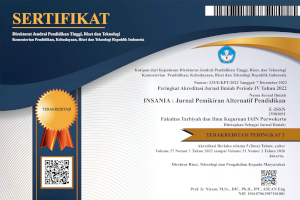PENGEMBANGAN PEMBELAJARAN ILMU PENGETAHUAN SOSIAL SEKOLAH DASAR BERWAWASAN SOSIAL-BUDAYA BERBASIS PAIKEM
DOI:
https://doi.org/10.24090/insania.v25i1.3919Kata Kunci:
Pembelajaran IPS SD, berwawasan sosial budaya, PAIKEMAbstrak
Tulisan ini mendeskripsikan tentang pengembangan pembelajaran Ilmu Pengetahuan Sosial (IPS) Sekolah Dasar berwawasan sosial-budaya berbasis PAIKEM. Pengembangan Pembelajaran Ilmu Pengetahuan Sosial Sekolah Dasar berwawasan sosial-budaya berbasis PAIKEM sebagai sebuah terobosan baru dalam proses pembelajaran Ilmu Pengetahuan Sosial tingkat Sekolah Dasar. Pengembangan ini dapat meminimalisir kekurangan-kekurangan dalam proses pembelajaran peserta didik dalam memahami mata pelajaran Ilmu Pengetahuan Sosial di Sekolah Dasar. Pengembangan ini juga ditujukan untuk meningkatkan kualitas proses pembelajaran IPS di Sekolah Dasar. Dalam menerapkan model-model pembelajaraan guru juga dituntut aktif, kreatif, dan selektif. Dari hasil pembahasan yang telah diuraikan, peneliti memformulasikan beberapa simpulan sebagai berikut: 1) proses pembelajaran menggunakan pendekatan sosial-budaya dapat menciptakan iklim belajar yang kondusif dan memberikan keleluasaan bagi peserta didik untuk melakukan improvisasi selama proses belajar; 2) model pembelajaran pendekatan sosial-budaya dapat meningkatkan pemahaman peserta didik tentang materi IPS, hal itu dapat dilihat dari grafik pemahaman peserta didik yang meningkat, hasil uji coba menunjukan bahwa rata-rata skor peserta didik dengan model belajar menggunakan pendekataan sosial-budaya lebih tinggi dari pada daripada skor rerata peserta didik yang dibelajarkan dengan model belajar konvensional; dan 3) terjadi peningkatan literasi sosial-budaya peserta didik yang berkaitan dengan materi yang dibelajarkan dalam pembelajaran IPS berpendekatan sosial-budaya dan berbasis PAIKEM.Unduhan
Referensi
Degeng, I.N.S. 1989. Ilmu Pengajaran: Taksonomi Variabel. Jakarta: P2LPTK.
Gagne, R.M. 1974. Essentials of Learning for Instruction. New York: Holt Rinehart and Winston.
Gagne, R.M. dan Briggs, L.J. 1979. Principles of Instructional Design. New York: Holt Rinehart and Winston.
Jarolimek, J. 1993. Social Studies in Elementary Education. New York: Mac Millan Publishing Co Ltd.
Kurikulum Tingkat Satuan Pendidikan. 2006. Mata pelajaran Ilmu Pengetahuan Sosial Jakarta: Depdiknas.
Muslimin Ibrahim. 2007. Pembelajaran Aktif, Inovatif, Efektif, Kreatif dan Menyenangkan. Surabaya: FIP Unesa.
Nu’man Somantri. 2001. Menggagas Pembaharuan Pendidikan IPS. Bandung: Remaja Rosda Karya.
Reigeluth, C.M. 1983. Instructional-Design Theories and Models: An Overview of Their Current Status. London: Lawrence Erlbaum Associates, Publishers.
Salomon G. 1972. “Heuristic models for the generation of aptitude-treatment interaction hypothesesâ€. Review of Educational Research. No. 42: 327-343.
Schuncke. GM. 1988. Elementary Social Studies. Knowing, Doing, Caring. New York: Macmillan Publishing
Slamawi,1996. Konsep Dasar Ilmu Pengetahuan Sosial. Jakarta: Ditjen Dikti
Snelbecker, G.E. 1983. Is Instructional Theory Alive and Well? New Jersey: Lawrence Erlbaum Association.
Suhanaji dan Waspodo Tjipto Subroto. 2003. Pendidikan Ilmu Pengetahuan Sosial. Surabaya: Insan Cendikia.
TIM UNESA. 2007. Model-Model Pembelajaran Inovatif. Surabaya: University Press Unesa.
Waspodo Tjipto Subroto dan Suhananji. 2005. Pengetahuan Dasar Ilmu-Ilmu Sosial.(Geografi, Sejarah, Ekonomi, Politik, Sosiologi dan Antropologi). Surabaya: Insan Cendikia
Unduhan
Diterbitkan
Cara Mengutip
Terbitan
Bagian
Lisensi
Authors who publish with this journal agree to the following terms:
Authors retain copyright and grant the journal right of first publication with the work simultaneously licensed under a Creative CommonsAttribution-ShareAlike License that allows others to share the work with an acknowledgment of the work's authorship and initial publication in this journal.
Authors are able to enter into separate, additional contractual arrangements for the non-exclusive distribution of the journal's published version of the work (e.g., post it to an institutional repository or publish it in a book), with an acknowledgment of its initial publication in this journal.
Authors are permitted and encouraged to post their work online (e.g., in institutional repositories or on their website) prior to and during the submission process, as it can lead to productive exchanges, as well as earlier and greater citation of published work (See The Effect of Open Access).








